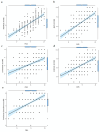The Correlation between Motor Skill Proficiency and Academic Performance in High School Students
- PMID: 39062415
- PMCID: PMC11273920
- DOI: 10.3390/bs14070592
The Correlation between Motor Skill Proficiency and Academic Performance in High School Students
Abstract
The intricate relationship between physical health and cognitive development has been a focal point of multidisciplinary research, suggesting that motor skill proficiency could influence academic outcomes. This study aimed to investigate the correlation between motor control, mobility, stability-measured by the Functional Movement Screen (FMS)-and academic performance among high school students. Conducted with 201 participants from a public high school in Spain, this descriptive non-experimental research divided students into high and low academic performance groups based on their average grade scores, with the median used as the criterion for distinction. The FMS was utilized to assess fundamental motor skills, and academic performance was verified across mathematics, language, science, and physical education subjects. The findings revealed a significant positive relationship between the FMS scores and academic achievement (r = 0.691; p < 0.001), indicating that students with higher motor skill proficiency had higher academic achievement. This correlation persisted across the various subjects, highlighting the potential benefits of integrating physical education and motor skill development into educational strategies. The study's results suggest that educational policies should advocate for comprehensive physical education programs to foster both physical well-being and academic improvement, thereby promoting a holistic educational model that enhances student performance across disciplines.
Keywords: academic performance; cognitive development; functional movement screen; high school students; motor skills; physical education.
Conflict of interest statement
The authors declare no conflicts of interest.
Figures
Similar articles
-
Recovery schools for improving behavioral and academic outcomes among students in recovery from substance use disorders: a systematic review.Campbell Syst Rev. 2018 Oct 4;14(1):1-86. doi: 10.4073/csr.2018.9. eCollection 2018. Campbell Syst Rev. 2018. PMID: 37131375 Free PMC article.
-
Small class sizes for improving student achievement in primary and secondary schools: a systematic review.Campbell Syst Rev. 2018 Oct 11;14(1):1-107. doi: 10.4073/csr.2018.10. eCollection 2018. Campbell Syst Rev. 2018. PMID: 37131395 Free PMC article.
-
Associations between motor proficiency and academic performance in mathematics and reading in year 1 school children: a cross-sectional study.BMC Pediatr. 2020 Feb 14;20(1):69. doi: 10.1186/s12887-020-1967-8. BMC Pediatr. 2020. PMID: 32059651 Free PMC article.
-
Relationships Between Motor Proficiency and Academic Performance in Mathematics and Reading in School-Aged Children and Adolescents: A Systematic Review.Int J Environ Res Public Health. 2018 Jul 28;15(8):1603. doi: 10.3390/ijerph15081603. Int J Environ Res Public Health. 2018. PMID: 30060590 Free PMC article.
-
Relationships between Motor Skills and Academic Achievement in School-Aged Children and Adolescents: A Systematic Review.Children (Basel). 2024 Mar 12;11(3):336. doi: 10.3390/children11030336. Children (Basel). 2024. PMID: 38539371 Free PMC article. Review.
Cited by
-
Study of body composition and motor competence in children from the 1st basic cycle and their relationship with school performance.BMC Pediatr. 2025 May 28;25(1):429. doi: 10.1186/s12887-025-05792-5. BMC Pediatr. 2025. PMID: 40437459 Free PMC article.
-
Longitudinal effects of stress in an academic context on psychological well-being, physiological markers, health behaviors, and academic performance in university students.BMC Psychol. 2025 Jul 8;13(1):753. doi: 10.1186/s40359-025-03041-z. BMC Psychol. 2025. PMID: 40629456 Free PMC article.
References
-
- Redondo-Flórez L., Ramos-Campo D.J., Clemente-Suárez V.J. Body Composition, Psychological, Cardiovascular, and Physical Activity Factors Related with Academic School Performance. Sustainability. 2021;13:8775. doi: 10.3390/su13168775. - DOI
LinkOut - more resources
Full Text Sources
Miscellaneous


